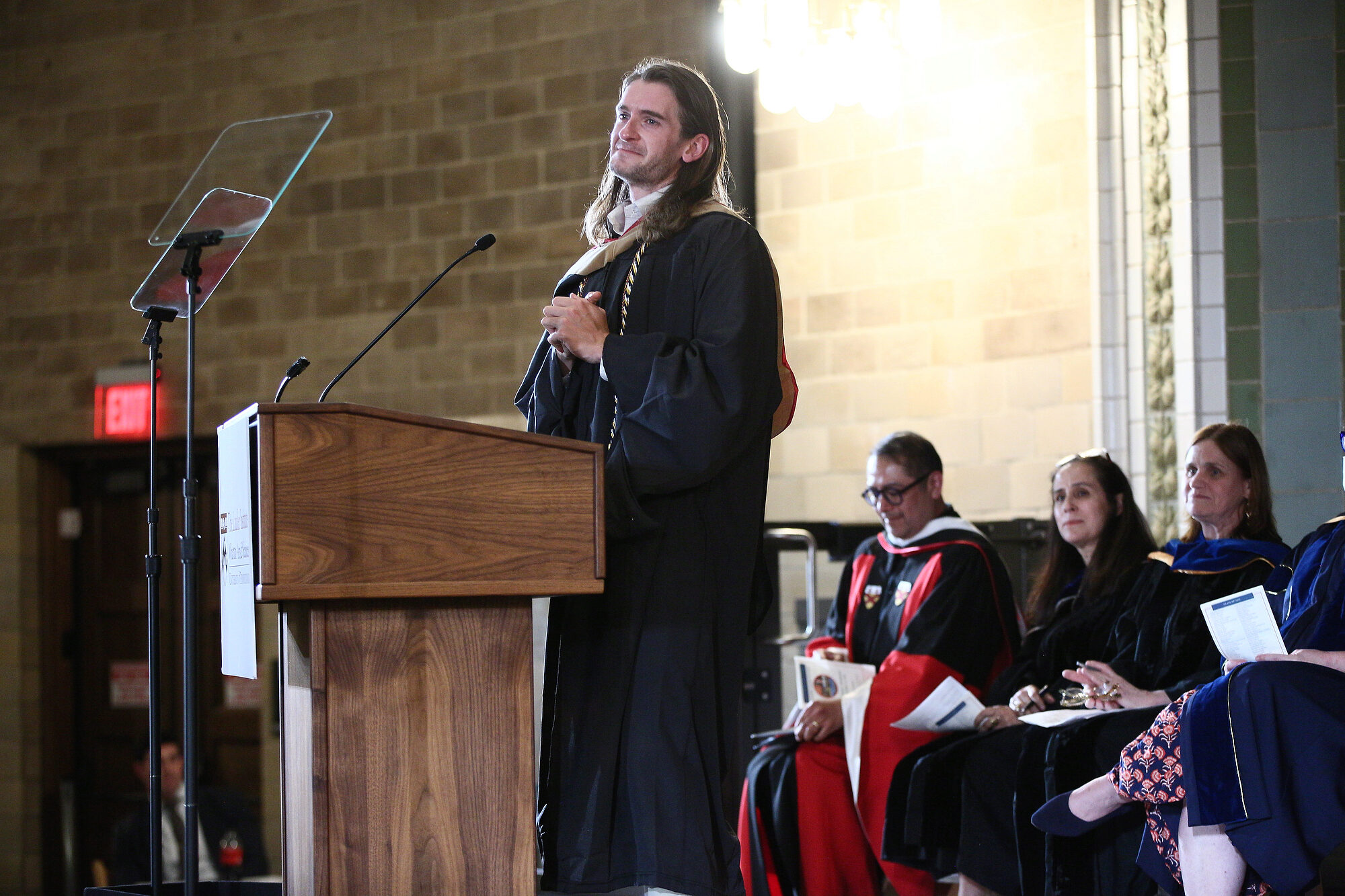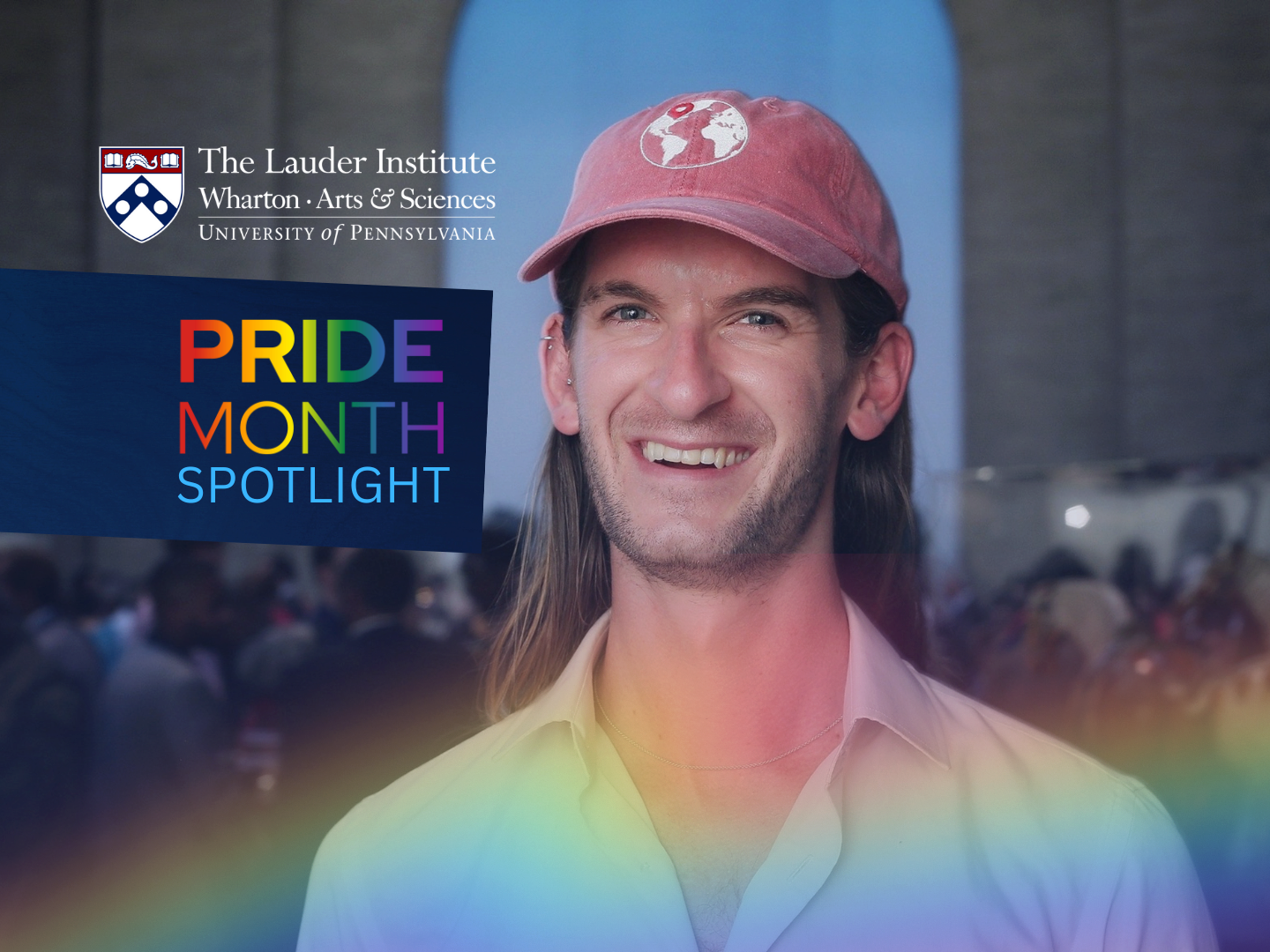LIVE WITH PRIDE: An Interview with Alexander Robinson (G’23, WG’23)
This Pride Month, we sit down with Alexander Robinson (G’23, WG’23), a proud member of the LGBTQ+ community and a recent graduate who served the Penn community as President of the Lauder Student Advisory Board, a Co-President of Wharton’s LGBTQ+ Social Club ‘Out4Business’, and a Wharton Student Life Fellow. Alexander earned a Wharton MBA with a joint major in Marketing & Operations and is a graduate of Lauder’s Latin America (Portuguese) Program.
In this candid interview, Alexander discusses their gender and sexual identity, LGBTQ+ rights from an international perspective, and the importance of allyship in business.
Was the community at Penn as inclusive as you were expecting and among the leadership roles that you held during your time here, what achievement are you proudest of?
I was really pleasantly surprised by the environment at Penn, which was incredibly open. Both the Lauder community and the LGBTQ+ community at Wharton are extremely diverse, so part of what I’m proudest of was helping people from different backgrounds, and of different sexual and gender identities, find common ground. In my role as a Student Life Fellow, I really enjoyed facilitating a six-week program called ‘Conversations That Matter’, which is focused on exploring identities of various kinds (racial, sexual, gender, cultural, linguistic), and discussing how they intersect and manifest on campus.
Where did you grow up and what was it that led you into studying Portuguese at Lauder?
I was born in Atlanta, Georgia, and lived in the US until middle school. My family then moved to South Africa for five years, followed by Kenya, which is where I graduated high school. Before returning to the US for college, I participated in a one-year service program in Salvador, Brazil, which is how I learned Portuguese. So, although I had lived overseas for almost a decade, Brazil was actually my first immersive foreign language experience. I loved it so much that in my freshman year of college, I decided to enroll in German classes. I ended up studying abroad in Munich and Berlin, and ultimately majored in German. These experiences eventually led me to The Lauder Institute. I think it’s a great anecdote for how studying foreign languages can open you up to worlds of possibility that you otherwise would not have considered.
“What I like about (the word) ‘queer’ is that it resists precise definition. It’s a prompt; almost a question that might lead people to talk with me directly to better understand who I am and what makes me unique.”
Throughout your travels and time living abroad, what has been your biggest takeaway on the status of LGBTQ+ rights from an international perspective?
I think one of the biggest things that has struck me is the incredible privilege that I have to live and work here in the United States as a queer and gender non-binary person. I’m grateful and proud that LGBTQ+ rights in the US have made a lot of progress in my lifetime. There are so many international students that come to Penn and are able to be ‘out’ for the first time, and I think that’s a wonderful thing. In comparison, in Kenya where I graduated high school, homosexuality is still criminal and punishable by up to 14 years in prison. In neighboring Uganda, you can receive a life sentence or face execution.
That said, there’s still so much progress to be made even here in the United States. For instance, right now we’re backsliding with increasing transphobia impacting trans rights. What happens in the US often paves the way for legislation and sentiment abroad, so I’m concerned with the direction we are heading.
Ultimately, I hope that the United States will make decisions that protect and safeguard the rights of everyone in the LGBTQ+ community – not just the ‘L’, not just the ‘G’, not just the ‘B’, but also the ‘T’, and others. Because once you start chipping away at certain facets of that community, the rights for the whole community are suddenly questioned. It’s a very slippery slope.
You mentioned that other countries approach LGBTQ+ rights very differently than the US. Can you talk about when you came into your identity and where you were living at the time? What kind of impact did that have on you?
I came into my sexual identity as I was finishing high school in Nairobi, where my rights were not guaranteed. Although I lived in an expat community and was able to operate in a different cultural milieu and with different privileges and protections than Kenyan citizens, nobody in my international high school was openly ‘out,’ and I didn’t have many LGBTQ+ role models. Had there been more role models, I think I would have come into my own earlier.
Generally speaking, I think living in environments where there is systemic political oppression prevents people from owning who they are, living authentically, and feeling free. And that levies a tax on every interaction, preventing you from contributing the most you can to society and to your community.
It wasn’t until I returned to the US for college that I felt secure enough to start engaging with the LGBTQ+ community and having conversations about my identity with those outside of my immediate family. I think identity formation really catalyzes when you’re able to start interacting with different types of people safely and can practice showing up in a space as someone who openly identifies as LGBTQ+.
“I believe that businesses should not only feature diverse identities but stand up for them when there’s pushback. That lived action is what makes a brand trustworthy.”
You identify as queer and non-binary. What does being queer and non-binary mean to you?
That’s a great question. I’ll start by prefacing that these words are fluid and they’ve evolved a lot in my lifetime. I use the word ‘queer’ with older generations, for instance, and they have an almost allergic reaction to it. I think now the community has come pretty far in reclaiming that word and giving it a new meaning. For me, ‘queer’ is my sexual identity. For me, it simply means ‘not straight.’ In other words, I’m interested in people of various gender identities. Now, this might sound vague, but what I like about ‘queer’ is that it resists precise definition. It’s a prompt; almost a question that might lead people to talk with me directly to better understand who I am and what makes me unique. I really value those conversations because they give me the opportunity to show who I am as a person, rather than being viewed through the lens of an already established label.
In terms of ‘non-binary’, that is my gender identity. Put simply, I don’t subscribe to the age-old male/female gender binary. For me, there’s so much gray in between. It’s really encouraging to see the conversations that are happening around what it means to be male or female, or present in a feminine or masculine way. I love seeing more “men” wear jewelry, get their ears pierced, rock longer hair, and “women” feeling empowered to don more masculine looks. I think it’s an exciting and dynamic time to express who you are and not feel beholden to the restrictions that a lot of us grew up under.
Your classmates chose you for the Lauder Zachary Woods Award for your commitment to helping others and building a kinder community. In your speech you mentioned that Lauder felt like a home for people who might not feel at home anywhere else. Can you talk more about that?
In most settings, when you’re interacting with people, you only share a certain side of yourself. What I like about Lauder is that it’s a community of people who come from all over the world and have multifarious identities, whether they be racial, cultural, or linguistic. Because of this diversity, it’s a wonderful, unique space where you can share multiple aspects, if not every aspect of yourself. At Lauder, I could be the kid who grew up in South Africa and Kenya and spent time in Brazil and studied German all at once rather than having to be one of those things at any one time. That sense of being seen more fully lights people up. It’s part of what makes the Lauder community so special.

What is the next step for you in your career and how do you think businesses can be better allies to the LGBTQ+ community?
I’ll be joining Neutrogena as a brand manager on their marketing team based in California. In terms of allyship, what I think the CPG (consumer packaged goods) industry can do is, for instance, promote the message that certain products, like skincare or self-care, are for everybody. For example, the use of diverse brand ambassadors intersectionally across all identities is critical, so that young people have a wider pool of role models. I also think it’s going to be very important for these brands to stand their ground when they get backlash for showing up for these communities. Look at Target and Anheuser-Busch as recent, albeit different, examples of how this situation has been handled. I believe that businesses should not only feature diverse identities but stand up for them when there’s pushback. That lived action is what makes a brand trustworthy and reliable in the eyes of the consumer. When it gets tough, you really have to stand by your values because otherwise they’re not anything more than words on a page.
Finally, can you talk about an LGBTQ+ role model that has inspired you and why?
I’m inspired by Jonathan Van Ness and really the whole Queer Eye show cast. They’re great examples of how to bring people in to have uncomfortable conversations in a positive way, how to challenge ideas without criticizing, and how to create public spaces for building mutual understanding. That kind of empathy and respect is what the world needs right now. ■
Learn more about The Lauder Institute’s commitment to diversity here.
Interview by Lauren Treutler



